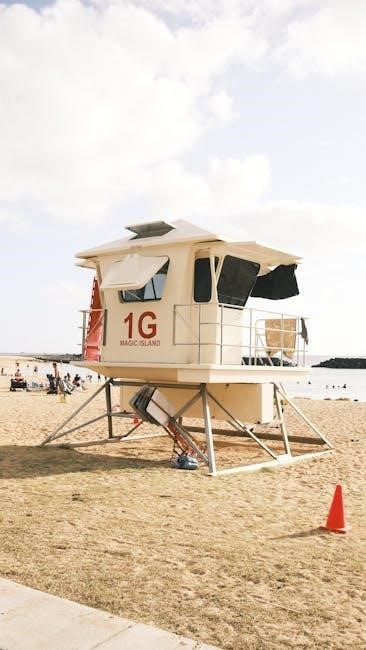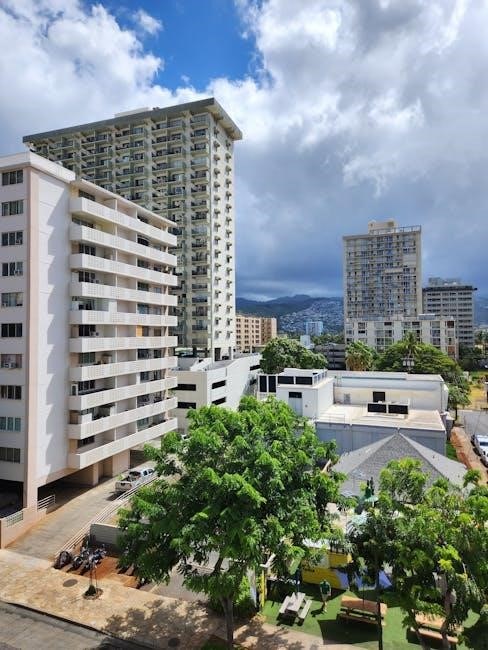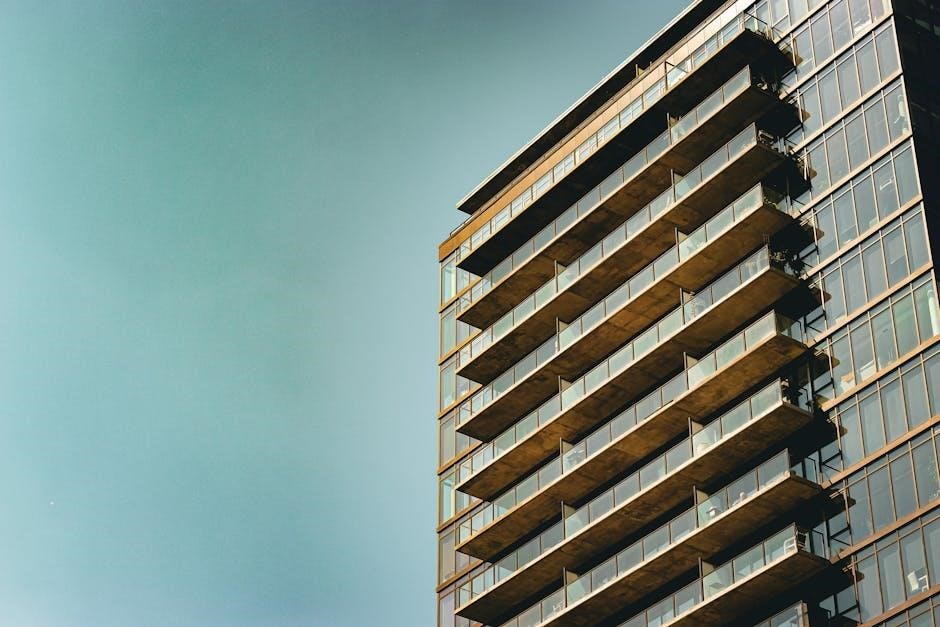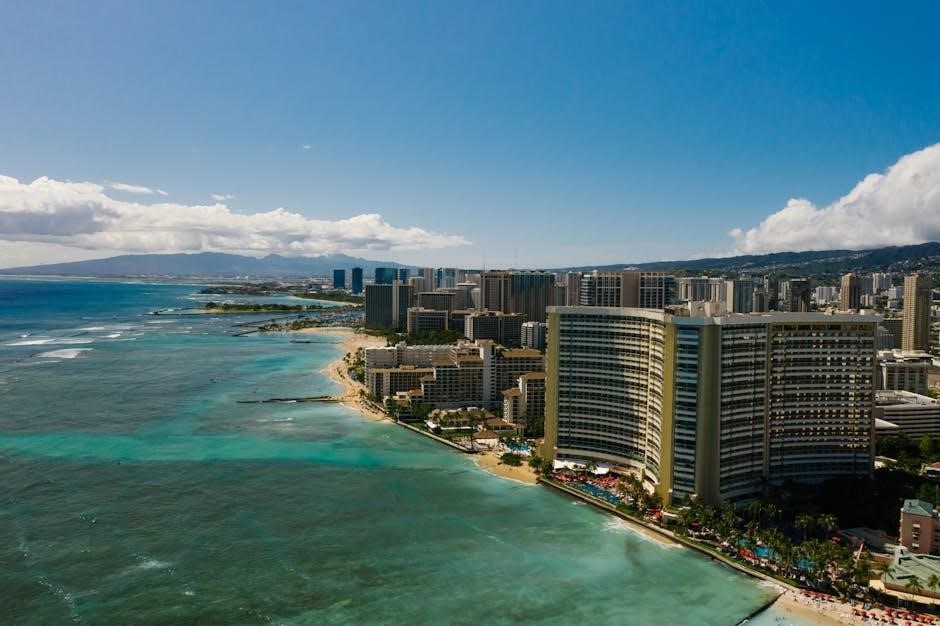Hawaii condominiums offer a unique blend of island living‚ investment potential‚ and vibrant communities‚ making them a popular choice for residents and investors alike․
1․1 Benefits of Owning a Condo in Hawaii
Owning a condo in Hawaii provides a unique lifestyle and financial benefits․ Condos offer luxury‚ convenience‚ and access to amenities like pools‚ gyms‚ and ocean views․ Many condos are located in prime areas‚ making them ideal for both vacation and permanent living․ Additionally‚ condos can serve as excellent investment properties‚ with potential rental income through platforms like Airbnb‚ especially in high-demand areas․ The Hawaiian lifestyle‚ with its stunning natural beauty and vibrant culture‚ attracts residents and visitors alike․ Condo ownership in Hawaii is a great way to enjoy island living while benefiting from a strong real estate market and desirable location․
1․2 Popular Condo Locations in Hawaii
Hawaii’s popular condo locations include Oahu‚ Maui‚ Kauai‚ and the Big Island․ Oahu‚ particularly Waikiki and Honolulu‚ offers urban convenience‚ beaches‚ and vibrant lifestyles․ Maui’s Lahaina and Kaanapali are known for luxury resorts and stunning ocean views․ Kauai’s Lihue and Kapaa provide a mix of natural beauty and modern amenities․ The Big Island’s Kona and Hilo areas attract buyers with diverse landscapes and affordable options․ Each location offers unique benefits‚ making them highly sought after for both living and investment․ These areas cater to a wide range of preferences‚ from bustling city life to serene coastal retreats‚ ensuring there’s something for everyone in Hawaii’s condo market․
Legal Considerations for Condo Ownership
Understanding Hawaii’s legal frameworks for condo ownership is crucial‚ covering regulations‚ rental laws‚ and nondiscrimination policies to ensure compliance and avoid potential legal conflicts․
2․1 Overview of Hawaii Condo Laws
Hawaii condo laws provide a regulatory framework to ensure fair practices and protect owners and renters․ These laws cover property rights‚ association rules‚ and compliance standards․ Key areas include short-term rental regulations‚ nondiscrimination policies‚ and governance of condo associations․ Understanding these laws is essential for navigating ownership smoothly․ They balance the interests of residents‚ investors‚ and communities‚ ensuring sustainable living conditions․ Recent updates focus on enforcing rental restrictions and maintaining community harmony․ Familiarizing oneself with these legal guidelines helps avoid disputes and ensures compliance with state and local ordinances․ Proper adherence to these laws fosters a stable and respectful living environment for all parties involved․
2․2 Short-Term Rental Regulations
Short-term rental regulations in Hawaii are complex and vary by island․ While platforms like Airbnb and VRBO are legal‚ strict rules apply․ Owners must register their properties and obtain proper permits․ Rentals are restricted in certain areas‚ and caps on nightly stays exist to preserve housing availability․ Non-compliance can result in hefty fines or legal action․ These regulations aim to balance tourism demand with community needs‚ ensuring long-term residents have access to affordable housing․ Understanding and adhering to these rules is crucial for condo owners considering short-term rentals․ Local ordinances should always be consulted before listing a property for short-term use․
2․3 Nondiscrimination Requirements in Condo Sales and Rentals
Hawaii strictly enforces nondiscrimination laws in condo sales and rentals‚ ensuring fair housing practices․ Protected categories include race‚ color‚ religion‚ sex‚ disability‚ marital status‚ and more․ Sellers and landlords must comply with federal and state laws‚ such as the Fair Housing Act‚ to avoid legal penalties․ Condo associations and property managers are also bound by these regulations‚ prohibiting discriminatory practices in membership or rental decisions․ Violations can result in lawsuits or fines‚ emphasizing the importance of understanding and adhering to these requirements․ These laws safeguard equal opportunities for all prospective buyers and renters‚ fostering inclusive communities across Hawaii․
The Condo Buying Process in Hawaii
Purchasing a condo in Hawaii involves researching properties‚ hiring a real estate agent‚ and understanding local market conditions to ensure a smooth transaction and informed decision․
3․1 Steps to Purchase a Condo
Purchasing a condo in Hawaii involves several key steps․ Start by determining your budget and hiring a reputable real estate agent․ Research properties that match your criteria‚ considering factors like location‚ amenities‚ and size․ Visit potential condos‚ evaluating their condition and surroundings․ Once you find a unit you like‚ work with your agent to make an offer and negotiate terms․ Conduct a condo inspection to identify any potential issues․ Secure financing through a pre-approved mortgage or alternative options․ Finally‚ review and sign the purchase agreement‚ complete closing procedures‚ and finalize the transaction to become a condo owner in Hawaii․
3․2 Financing Options for Condo Buyers

Financing a condo in Hawaii can be achieved through various options tailored to different buyer needs․ Traditional fixed-rate and adjustable-rate mortgages remain popular choices‚ offering stability and flexibility․ Government-backed loans‚ such as FHA and VA loans‚ provide lower down payment requirements and favorable terms for eligible buyers․ Some buyers opt for jumbo loans for higher-priced properties․ Additionally‚ cash purchases are common‚ especially among investors․ It’s crucial to research and compare rates from multiple lenders to secure the best terms․ Consulting with a financial advisor can help navigate the process and ensure the chosen financing option aligns with long-term financial goals․
3․3 Importance of Condo Inspections
Condo inspections are crucial for identifying potential issues before finalizing a purchase․ In Hawaii’s tropical climate‚ properties may face unique challenges like termite damage or mold growth․ A thorough inspection assesses the condition of the unit‚ including plumbing‚ electrical systems‚ and structural integrity․ This process helps buyers avoid costly surprises post-purchase․ Additionally‚ inspections can reveal needed repairs‚ providing leverage for negotiations or requesting the seller to address issues․ While not mandatory‚ an inspection offers peace of mind and financial protection‚ ensuring a smoother transition into ownership․ It’s a vital step in securing a sound investment in Hawaii’s competitive condo market․

Condo Market Trends in Hawaii
Hawaii’s condo market reflects rising demand‚ driven by tourism recovery and limited inventory․ Current trends show steady price growth‚ influenced by economic stability and lifestyle preferences․
4․1 Current Market Conditions
Hawaii’s condominium market is experiencing steady growth‚ fueled by increasing demand for island living and limited inventory․ Remote work trends have boosted interest‚ especially among mainland buyers seeking tropical lifestyles․ Prices remain elevated due to high demand and limited supply‚ with coastal properties being particularly sought after․ Short-term rental regulations have shifted investor focus toward long-term rentals‚ stabilizing the market․ Additionally‚ environmental concerns and zoning laws are influencing development‚ ensuring sustainable growth․ The market attracts both residents and investors‚ creating a dynamic yet competitive environment for condo buyers in Hawaii․

4․2 Factors Influencing Condo Prices
Condo prices in Hawaii are influenced by location‚ with coastal properties commanding premium prices due to scenic views and high demand․ Regulatory changes‚ such as short-term rental restrictions‚ impact investment appeal and pricing․ Property taxes‚ maintenance fees‚ and emerging environmental policies also play a role․ Additionally‚ the cost of construction materials and labor shortages contribute to higher prices․ Demand from remote workers and mainland buyers further drives up values․ Water safety concerns and infrastructure improvements can also affect pricing trends․ These factors create a dynamic market where prices fluctuate based on supply‚ demand‚ and regulatory shifts‚ making Hawaii’s condo market uniquely competitive and complex․
4․3 Future Outlook of the Condo Market
Hawaii’s condo market is expected to remain strong‚ driven by sustained demand for island living and investment opportunities․ Remote work trends and rising tourism may boost demand‚ while environmental sustainability efforts could reshape condo developments․ However‚ regulatory changes and economic factors may impact affordability and availability․ Experts predict continued growth in premium coastal properties‚ while urban areas could see increased density․ Buyers and investors should stay informed about market shifts and policy updates to navigate this evolving landscape effectively․
Property Management and Maintenance
Property management companies handle maintenance‚ enforce rules‚ and manage finances‚ ensuring smooth condo operations․ Regular upkeep preserves property value and enhances residents’ living experience․
5․1 Role of Property Management Companies
Property management companies play a vital role in maintaining the smooth operation of Hawaii condominiums․ They handle tasks such as maintenance‚ repairs‚ and financial management‚ ensuring the property remains well-maintained and financially stable․ These companies also enforce community rules‚ manage tenant or owner disputes‚ and oversee compliance with local regulations․ By hiring professionals‚ condo owners can avoid the hassle of day-to-day management‚ allowing them to focus on other priorities․ Effective property management enhances the overall living experience for residents and protects the property’s value over time․
5․2 Tips for Self-Managing Your Condo
Self-managing a condo in Hawaii requires organization‚ attention to detail‚ and clear communication with residents․ Start by creating a detailed budget and maintaining reserve funds for unexpected repairs․ Regularly inspect common areas and address maintenance issues promptly to prevent costly problems․ Communicate openly with owners and tenants through newsletters or meetings to ensure transparency․ Keep thorough records of financial transactions‚ maintenance schedules‚ and compliance with local regulations․ Consider investing in property management software to streamline tasks like billing and communication․ Finally‚ stay informed about Hawaii’s specific legal requirements to avoid penalties and ensure smooth operations․

Taxes and Fees Associated with Condo Ownership
Hawaii condo ownership involves property taxes and monthly maintenance fees‚ covering building upkeep and amenities․ Ensure compliance with Hawaii’s specific legal requirements for seamless ownership․
6․1 Understanding Property Taxes in Hawaii
Property taxes in Hawaii are assessed annually‚ with rates varying by island and property type․ Condo owners pay taxes based on the assessed value of their unit‚ which is determined by county assessors․ Rates typically range between 0․3% to 1․2% of the property’s value․ Tax bills are issued in July and payments are due by August 20th․ Failure to pay may result in penalties or liens․ Additionally‚ Hawaii offers tax relief programs for residents‚ including exemptions for primary residences․ Understanding these tax obligations is crucial for condo ownership‚ as they contribute to local services and infrastructure․ Consulting with tax professionals is recommended for accurate compliance․
6․2 Monthly Maintenance Fees and What They Cover
Monthly maintenance fees for Hawaii condos vary by location‚ property size‚ and amenities․ These fees typically cover common area upkeep‚ utilities‚ building maintenance‚ and sometimes extras like gym or pool access․ Luxury condos in areas like Waikiki or Maui may charge higher fees due to premium amenities․ It’s essential to review the condo’s budget and fee structure before purchasing to understand what’s included and avoid unexpected costs․ Fees may also fund reserves for future repairs‚ ensuring the property remains well-maintained․ Understanding these fees is crucial for budgeting and ensuring long-term satisfaction with condo ownership in Hawaii’s unique real estate market․

Mistakes to Avoid When Buying a Condo in Hawaii

Overlooking condo rules‚ ignoring maintenance fees‚ and not researching property history can lead to costly surprises․ Ensure thorough due diligence to avoid common buying pitfalls in Hawaii․
7․1 Common Pitfalls for First-Time Buyers
First-time buyers often overlook critical factors when purchasing a condo in Hawaii․ One major pitfall is failing to research short-term rental laws‚ which vary by island and can impact investment potential․ Another common mistake is not thoroughly reviewing the condo’s governing documents‚ such as CC&Rs‚ which outline rules and fees․ Buyers may also underestimate the importance of understanding maintenance costs and special assessment fees‚ leading to financial strain․ Additionally‚ some buyers rush into purchases without conducting proper inspections or researching the building’s history‚ which can result in unexpected repairs or legal issues․ Prioritizing due diligence is essential to avoid these costly oversights․
7․2 Importance of Due Diligence
Due diligence is crucial when buying a condo in Hawaii to avoid costly surprises․ Buyers should carefully review the property’s legal documents‚ including CC&Rs‚ to understand rules and restrictions․ Checking the condo association’s financial health is vital to avoid future special assessments or hidden fees․ Additionally‚ researching the building’s history‚ such as past disputes or structural issues‚ can prevent legal or maintenance headaches․ Understanding the condo’s rental policies and ensuring compliance with local regulations is also essential․ A thorough inspection and review of all documentation ensure a smooth transaction and long-term satisfaction․ Skipping these steps can lead to financial or legal challenges down the line․
